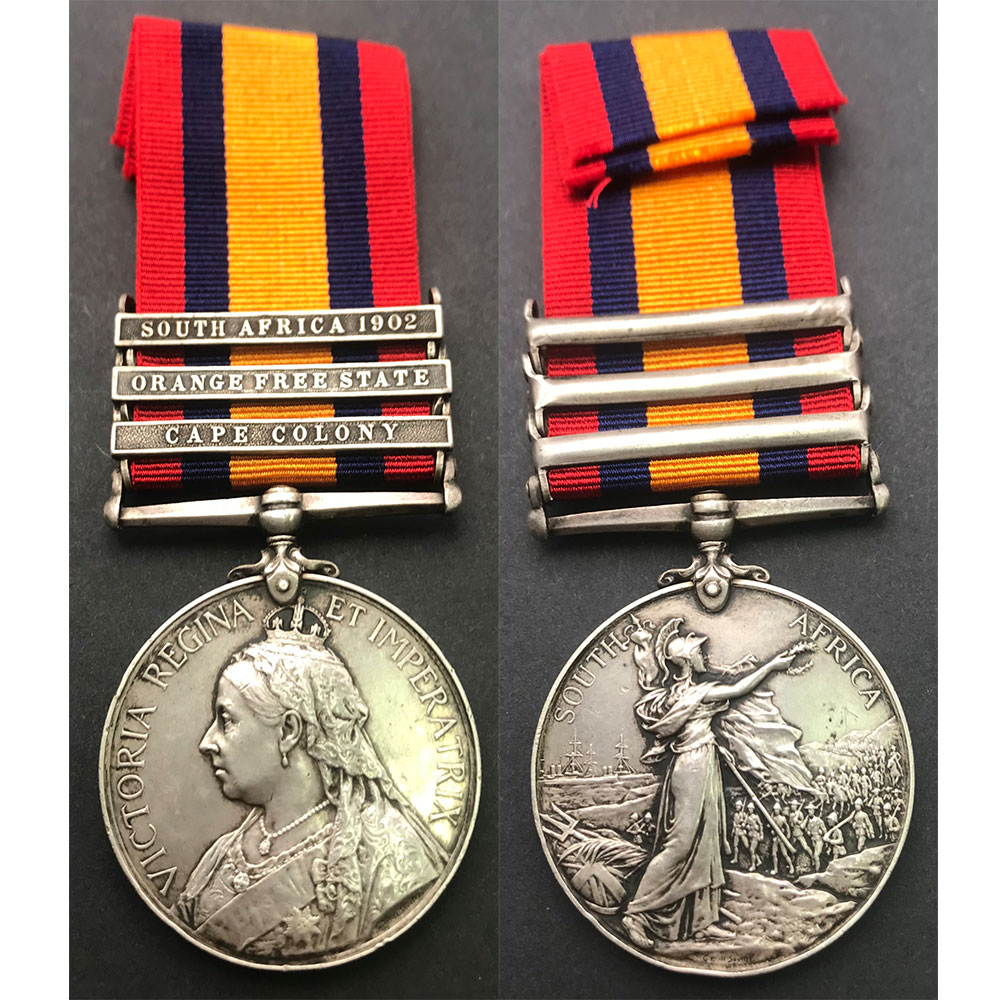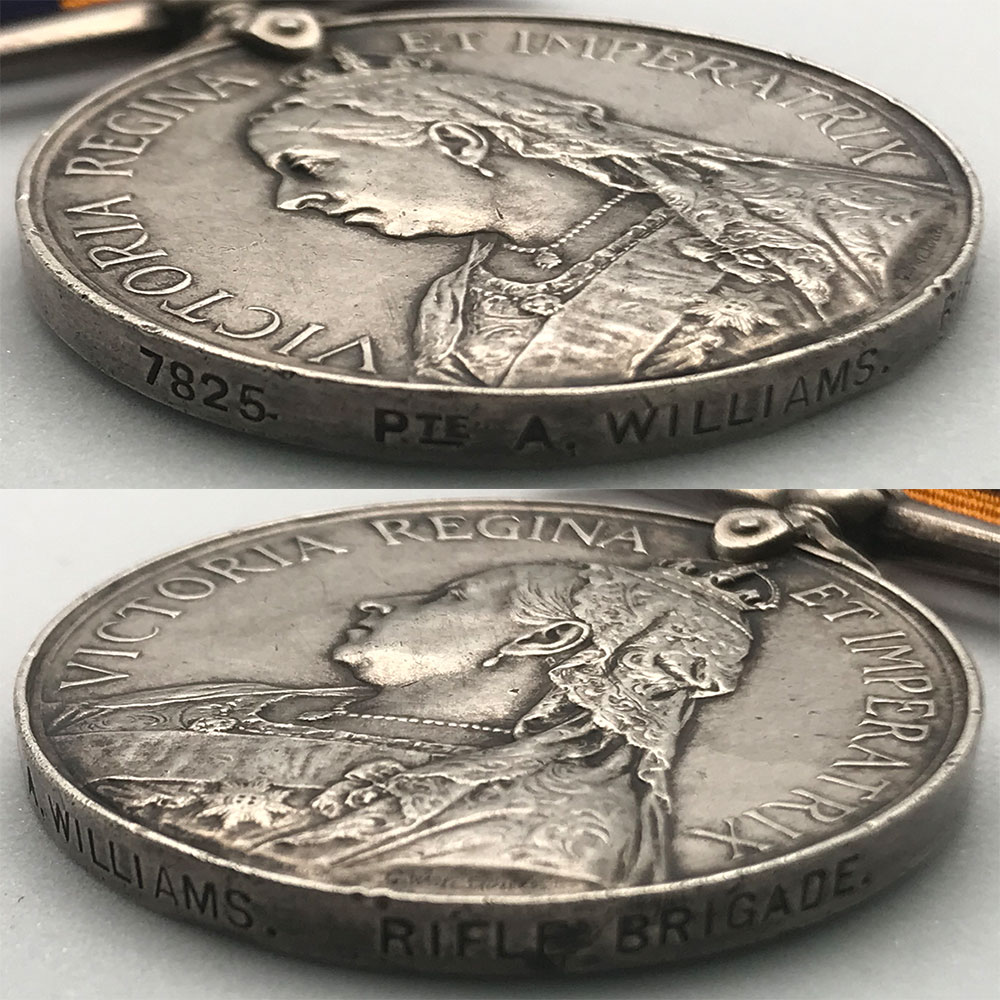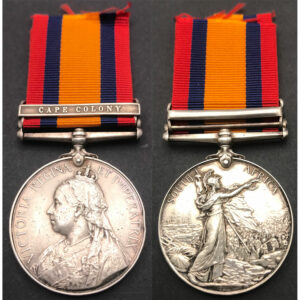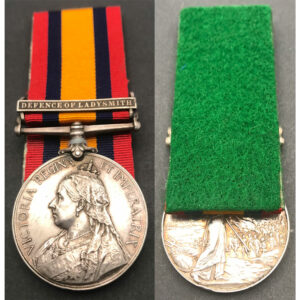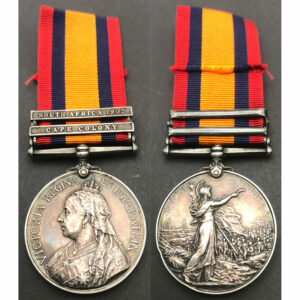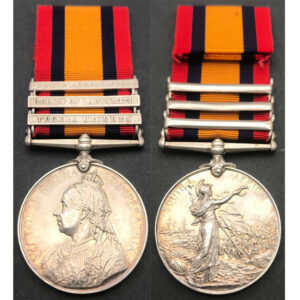Description
Queen’s South Africa, 3 bars, Cape Colony, Orange Free State, SA 1902, 7825 Pte A. Williams, 4th Battalion Rifle Brigade.
Officially impressed: “7825 Pte A. Williams Rifle Brigade”
Medal entitlement confirmed on the roll.
He later ran off from home after WW1 to be with his Maid, leading to a divorce court case airing out the couples affairs in the local newspapers. He claimed to be a decent fellow who was being abused by his wife in a loveless marriage and as such had to “seek the caress and sympathy that my soul has craved for years to feel.”
Alfred Vivian Williams was born in Alesford, Winchester, Hampshire circa 1882.
He attested for service aged 18 during the war on 27th April 1900, he was working as a Hotel Servant.
He saw the following service over his 12 years:
Home, 27th April 1900 – 15th Dec 1901
South Africa, 16th December 1901 – 3rd Feb 1903
Home, 4th Feb 1903 – 7th November 1905
Malta, 8th November 1905 – 24th Oct 1906
Home, 25th Oct 1906 – 26th April 1912.
With the outbreak of WW1, he was living in Warwick when he enlisted once again on 11th December 1915 and joined the Royal Flying Corps.
During WW1, as the war was closing his RAF records show as 120275 A.V. Williams, R.A.F. “His voluntary transfer to the Army Pay Corps at A.P.C. rates of pay, 11th July 1918.”
A letter from Colonel Regimental Paymaster at Warwick, dated June 1918:
“I am informed that No 120275 3rd Class Air Mechanic A.V. Williams, Royal Flying Corps, has been transferred to the Depot under your command. This man was, previous to enlistment, accepted by me for the Army Pay Corps, but failed to produce the letter which was given him when he was sent to the 36th Recruit Distribution Battalion, and consequently he was posted to the Royal Flying Corps and I was unable to obtain his services.
In the even of of his being transferred to you for disposal, and should he be in Grade II or III I shall be much obliged if he can be transferred to this office on probation in accordance with ACI 591/18 and 1613/17.”
After the war a rather odd notice was taken out in the local Leamington Spa Courier, 8th July 1921:
“NOTICE IS HERBY GIVEN that certain grossly slanderous and unfounded statements have been made by several persons with regard to MR ALFRED VIVIAN WILLIAMS of 2 Woodville Road, Warwick.
Any persons making or repeating any such statements will at once be prosecuted.
A reward of £10 will be paid for such information as will lead to the conviction of the person or persons responsible for such statements.
All communications to be addressed to the undersigned.
BODDINGTON AND BOND, Castle Lane, Warwick, Solicitors.”
This lead to his divorce in October 1921, which was subject to a large article on the court case about his “transgressions” with his maid.
“Mrs Williams said she was married in 1910 and they lived happily together until about Easter of this year. her husband then commenced to pay attentions to a Maid she engaged.
The girl had stated that witness would not live long and she was to be the wife of the defendant.
Witness remonstrated with her husband, but it was of no avail, and things got worse and worse.
Under orders of the Insurance Company by which he was employed defendant was removed to Aylesbury.”
“At this point, the Magistrates’ Clerk (Mr. J. Tibbits) read the following extract from a letter written by the defendant to his wife:
“I have not ceased to think over our situation, and the more I think, the more solid a conclusion I come to, that we can never live together again. You know that for years there has been no love between us, and for months, it has been getting worse and worse, and we have been drifting further and further apart. The climax has now been reached, and there is no other way than parting to ensure both of us even living our allotted span of life.
I really cannot, neither can you, live again the life of the last few months, nor do I intend to, but that is exactly what will happen if you come to Aylesbury—just a return to the old ways and violent tempers. It cannot be. I cannot have you live with me any more. I don’t want to recriminate or wholly blame you for the past, but I think in this that if you really had that wonderful love which only a woman can possess and show, I should not have been driven, or even attempted, to seek the caress and sympathy that my soul has craved for years to feel.
Even when you were slandering me in Warwick, you were wickedly wrong and unjust, for I then was pure to you. I have since transgressed, as you already know, but I ask no forgiveness, for you cannot forgive, as from experience I know only too well. I feel very, very bitter when I think what might have been. Time, talent, and money we have wasted, but let us forget each other in our bitter disappointment and go our separate ways and live.
I have been compelled to get lodgings in a locality like Woodhouse-street, where you would not care to live, as I cannot afford to have lodgings looked out for me. You cannot in any case live here as I share the bedroom. To obtain a house is next to impossible unless I could find one…” “
